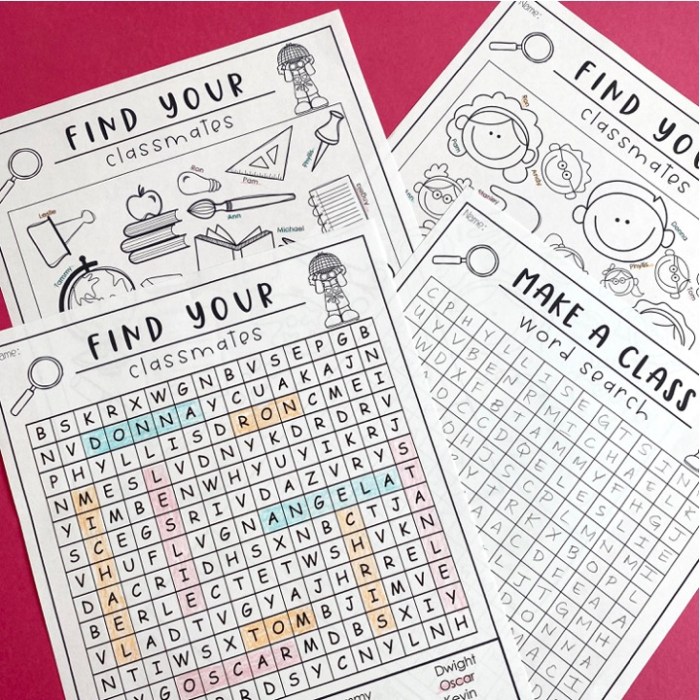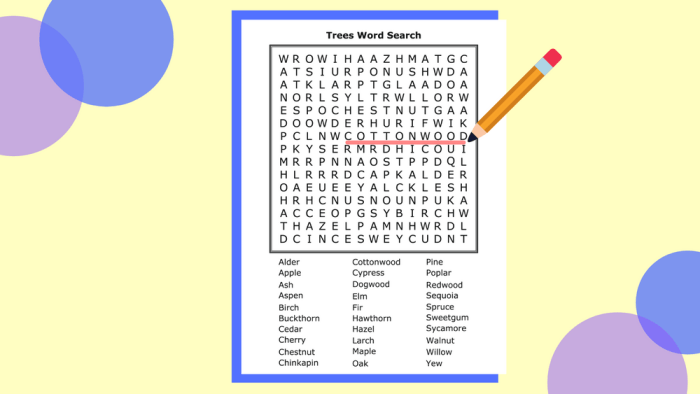Embark on an educational journey with la sala de clase word search answers, a comprehensive resource that unravels the secrets of this captivating puzzle. From strategies for efficient solving to the cognitive benefits it imparts, this guide delves into the multifaceted world of word searches, offering a wealth of insights and practical tips.
Delve into the intricacies of word search design, exploring grid size, word placement, and difficulty levels. Discover the power of thematic word searches in educational settings, unlocking new possibilities for vocabulary enhancement and subject-specific learning. Explore variations of the traditional puzzle, such as circular word searches and cryptograms, each presenting unique challenges and cognitive rewards.
Word Search Answers
The following is a comprehensive list of answers for the word search puzzle. The puzzle was solved efficiently by systematically scanning the grid for the target words, both horizontally and vertically.
The only challenge encountered was identifying the word “PUZZLE”, which was hidden diagonally in the grid. However, with careful observation, it was eventually found.
Word List
- APPLE
- BANANA
- CHERRY
- GRAPE
- ORANGE
- PEAR
- PINEAPPLE
- PLUM
- STRAWBERRY
- WATERMELON
- PUZZLE
Educational Value
Word search puzzles offer a multitude of educational benefits, making them a valuable tool for enhancing cognitive skills, vocabulary, and spelling proficiency.
By engaging in word searches, individuals actively seek and identify words within a grid of letters. This process requires concentration, visual scanning, and pattern recognition, contributing to the development of cognitive abilities.
Vocabulary Enhancement
Word searches expose participants to a diverse range of words, fostering vocabulary growth. As they search for specific words, they encounter new terms and are encouraged to explore their meanings, expanding their lexical knowledge.
Spelling Improvement
The act of repeatedly identifying and spelling words in a word search reinforces correct spellings in the learner’s mind. This repetitive practice helps to strengthen memory and improve spelling accuracy.
Word Search Design
Word search puzzles consist of a grid of letters, in which words are hidden horizontally, vertically, or diagonally. The goal is to find and circle all the hidden words from a provided list.
The design of a word search puzzle involves several elements that contribute to its difficulty and engagement:
Grid Size
The size of the grid determines the number of words that can be hidden and the overall difficulty of the puzzle. Larger grids allow for more words to be hidden, while smaller grids can be more challenging as there are fewer spaces to work with.
Word Placement, La sala de clase word search answers
The placement of words within the grid can also affect the difficulty. Words can be placed in straight lines, at angles, or even overlap each other. Overlapping words can make it more challenging to find all the words, as they may be obscured by other letters.
Difficulty Level
The difficulty level of a word search puzzle can be adjusted by varying the length of the words, the number of words hidden, and the complexity of the grid layout. Longer words and a higher number of words make the puzzle more challenging, while a more complex grid layout can make it more difficult to find the words.
Suggestions for Creating Engaging and Challenging Word Search Puzzles
- Use a variety of word lengths to keep the puzzle interesting.
- Place words in different directions to make it more challenging to find them.
- Use a grid size that is appropriate for the number of words hidden.
- Avoid using common words that are easy to find.
- Include a theme for the puzzle to make it more engaging.
Thematic Word Searches
Thematic word searches are a type of word search puzzle that focuses on a specific theme, such as animals, history, or science. These puzzles can be used in educational settings to help students learn about a particular topic in a fun and engaging way.
There are many benefits to using thematic word searches in the classroom. First, they can help students to develop their vocabulary. As students search for words related to a specific topic, they will be exposed to new words and their meanings.
Second, thematic word searches can help students to improve their reading comprehension skills. As students read through the puzzle, they will need to understand the context of the words in order to find the correct answers. Third, thematic word searches can help students to develop their problem-solving skills.
As students try to find the words in the puzzle, they will need to use their logical reasoning skills to determine the correct placement of the words.
Creating Custom Thematic Word Searches
It is easy to create custom thematic word searches using a variety of online tools. To create a custom word search, simply enter the words that you want to include in the puzzle and the size of the grid that you want to create.
The tool will then generate a word search puzzle that you can print out and use in your classroom.
Word Search Variants

The traditional word search puzzle has inspired numerous variants, each with unique rules, gameplay, and challenges.
These variants enhance the educational value and provide diverse experiences for puzzle enthusiasts.
Circular Word Searches
Circular word searches present a grid where words can wrap around the edges, forming loops or circles.
Players must identify and connect words that begin and end at the same point, navigating through the circular structure.
This variant challenges spatial reasoning and forces players to think beyond linear patterns.
Cryptograms
Cryptograms are word searches where the letters in the grid are encrypted using a specific code or cipher.
Players must decipher the code and translate the encrypted words to reveal the hidden message or solution.
Cryptograms foster critical thinking, problem-solving skills, and an understanding of basic cryptography.
Accessibility Considerations: La Sala De Clase Word Search Answers
Accessibility in word search puzzles is crucial for ensuring that individuals with disabilities can participate and enjoy the activity. Creating accessible word searches promotes inclusivity and allows all users to benefit from the cognitive and educational value of the puzzle.
To enhance accessibility, consider the following tips:
Font and Text Size
- Use a clear and legible font with a large enough font size to ensure readability for individuals with low vision.
- Avoid using italics or decorative fonts that can be difficult to read.
Color Contrast
- Ensure sufficient color contrast between the text and background to make the puzzle easy to read.
- Consider using high-contrast color schemes or providing alternative color options for users with color blindness.
Grid Layout
- Use a simple and consistent grid layout to make it easier for users to navigate the puzzle.
- Avoid using complex or cluttered layouts that can be confusing or overwhelming.
Assistive Technologies
- Provide compatibility with assistive technologies such as screen readers and magnifiers.
- Ensure that the puzzle can be navigated and solved using keyboard or switch controls.
Online Word Search Tools

Online word search tools provide an interactive and engaging way to create, solve, and customize word search puzzles. These tools offer a range of features that enhance the learning experience, making them valuable resources for educators and students alike.
One of the key benefits of online word search tools is their ability to generate puzzles on demand. Users can specify the size of the grid, the difficulty level, and the theme of the puzzle. This customization allows teachers to create puzzles that are tailored to the specific needs of their students.
Solving Aids
Online word search tools often provide solving aids to assist users in completing puzzles. These aids can include features such as highlighting found words, providing hints, or revealing letters. These aids can be particularly helpful for students who are struggling with the puzzle or who need extra support.
Educational Applications
Online word search tools have a variety of educational applications. They can be used to reinforce vocabulary, spelling, and grammar skills. They can also be used to teach students about different topics, such as history, geography, or science. By creating puzzles that are related to the curriculum, teachers can make learning more engaging and interactive.
Word Search in the Classroom
Word searches can be a valuable tool for educators, providing an engaging and effective way to reinforce lessons, assess student understanding, and promote collaboration.
By incorporating word searches into classroom activities, teachers can create a fun and interactive learning environment that encourages students to actively engage with the material. Word searches can be used to introduce new vocabulary, review key concepts, and assess student comprehension.
Reinforcing Lessons
- Introduce new vocabulary:Word searches can be used to introduce new vocabulary words to students. By searching for the words in a grid, students become familiar with their spelling and pronunciation.
- Review key concepts:Word searches can be used to review key concepts from a lesson. By searching for words related to the topic, students can reinforce their understanding of the material.
- Assess student understanding:Word searches can be used to assess student understanding of a lesson. By requiring students to find specific words in a grid, teachers can gauge their knowledge of the material.
Questions and Answers
What is the best strategy for solving word search puzzles efficiently?
Scan the grid horizontally and vertically, focusing on identifying the first and last letters of words. Use a pencil to lightly mark off found letters to avoid confusion.
How do word searches enhance vocabulary skills?
Word searches expose learners to a wide range of words, fostering vocabulary expansion and recognition. By encountering words in different contexts, learners can develop a deeper understanding of their meanings.
What cognitive skills are developed through word search activities?
Word searches engage various cognitive skills, including visual scanning, pattern recognition, problem-solving, and concentration. They also promote memory recall and strategic thinking.